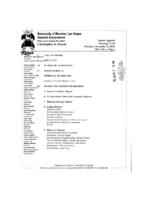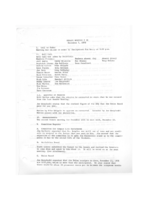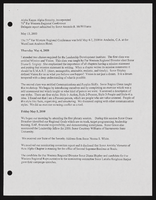Search the Special Collections and Archives Portal
Search Results

Transcript of interview with Michael J. Signorelli by Claytee D. White, Stefani Evans, August 4, 2016
Date
Archival Collection
Description
Michael Signorelli, long-time Las Vegas resident and builder of many local homes, apartments and hotels, describes his upbringing, career, and stellar reputation as part of the “Building Las Vegas” oral history project. Raised in Rhode Island, the only child of an Italian-American father and a Southern Baptist mother, Michael’s early life was influenced by his father’s disability as a World War Two veteran and his non-English speaking paternal grandparents, who owned and ran a grocery store. Talking of his experiences in helping them run the grocery store he says, "I became a businessman at the age of twelve." His military service during the Vietnam War landed him at Nellis Air Force Base in Las Vegas. Once here, Michael furthered his education at UNLV, obtaining both his MEd and PhD degrees. In Las Vegas Michael began his work in the housing arena working for Sun Home Builders and his non-profit work, helping to raise funds for the newly formed Rape Crisis Center. Signorelli went on to work for Howard Hughes's Summa Corporation, where he successfully fought against a discrimination lawsuit brought by twenty-one female dealers. In 1978 Michael started his own company, Nicro Corporation, and began building homes in the Las Vegas valley with land he acquired on a hand-shake and a verbal contract. He continued his non-profit work, which included coordinating Lady Bird Johnson’s Green Thumb project for Nevada and the Pacific Northwest. In the 1980s Signorelli was recruited by the Fitzgerald Group, where he was involved in non-gaming operations for their many hotels, cattle ranch, and an in vitro clinic. In this interview, Signorelli describes his non-Las Vegas building projects in Mesquite and Laughlin. He built the Mesquite Star hotel and casino by overcoming multiple hurdles around water access and money. Despite twice obtaining a loan for one hundred million dollars, he was never able to successfully complete the Laughlin hotel and casino, due to legal issues from his partner’s family trust. Signorelli also shares his idea for a unique hotel and casino called the Nev Star that involved his successful negotiation of a waiver to Senate Bill 208. Signorelli concludes his interview by talking about his ownership of the world-famous Golden Steer Steak House restaurant, which opened in 1958. Under Signorelli’s ownership the Golden Steer has been featured in national publications and claims many legendary fans such as NACAR driver Mario Andretti, who in 2016 celebrated his seventy-six birthday at the Golden Steer. Signorelli’s love of Las Vegas and its many positive traits come forth as he talks about his daughter and her achievements and suggests Vegas promoters should do a better job about what great schools, medical care, and government we have in Las Vegas.
Text

Interview with Fred Ray Huckabee, January 21, 2005
Date
Archival Collection
Description
Text

Meeting minutes for Consolidated Student Senate, University of Nevada, Las Vegas, December 02, 2002
Date
Archival Collection
Description
Text

Meeting minutes for Consolidated Student Senate, University of Nevada, Las Vegas, December 7, 1976
Date
Archival Collection
Description
Text

Alpha Kappa Alpha Sorority, Theta Theta Omega Chapter 71st Far West Regional conference reports
Date
Archival Collection
Description
From the Alpha Kappa Alpha Sorority, Incorporated, Theta Theta Omega Chapter Records (MS-01014) -- Chapter records file.
Text

Transcript of interview with Christie Young by Dennis McBride, October 18, 1998
Date
Archival Collection
Description
I've known Christie Young for many years and was grateful she agreed to be interviewed for the Las Vegas Gay Archives Oral History Project. Not only is she frank in what she says, but her background as a researcher in sexual issues and as a straight woman involved in the gay community give her a unique perspective. Ancillary to her donation of this interview transcript to the University of Nevada, Las Vegas, Christie has generously donated her personal journals which detail more than a decade of her life including the years she worked with Las Vegas's gay community . Christie shares the project's concern that documentation of the gay community is ephemeral and vanishes rapidly; her determination that her contribution to that community be preserved greatly enriches our knowledge and will benefit future scholars.
Text

Transcript of interview with Dorothy Kelsey by James M. Greene, January 20, 1975
Date
Archival Collection
Description
On January 20, 1975, collector James M. Greene interviewed housewife, Dorothy Kelsey (born May 28, 1916 in Kingman, Arizona) in her home in Nelson, Nevada. This interview covers the early days of Nelson, Searchlight, and Las Vegas, as Mrs. Kelsey offers an in-depth personal narrative on the life of a local old-timer. The interview concludes with a discussion on hotels and casinos.
Text

Transcript of interview with Mitchell A. Cobeaga by Raymond E. Frey, March 14, 1976
Date
Archival Collection
Description
On March 14, 1976 Raymond E. Frey interviewed Vice President of Nevada State Bank, Mitchell A. Cobeaga (born December 11, 1917 in Lovelock, Nevada) at Mr. Frey’s home in Las Vegas, Nevada. This interview covers early life in Nevada and the history of the Nevada State Bank. During this interview Mr. Cobeaga also discusses education in Nevada in the twenties and thirties, and Southern Nevada’s influence over the rest of the state.
Text

Transcript of interview with Dorothy George by Claytee White, October 13, 2003
Date
Archival Collection
Description
After serving as a nurse in World War II in Hawaii, Okinawa and Japan, Dorothy returned home to Chippewa Falls, Wisconsin. She experienced a particularly bad winter and she set out for California but stopped in Las Vegas to visit the family of her traveling companion, a girlfriend from her home town. The girlfriend returned to Wisconsin and George applied for a nursing license and got it within three days. She never left. Dorothy met her husband while working the night shift at Clark County Hospital. He would come in regularly to assist his patients in the births of their babies. Their occupations and their service in World War II drew them together in a marriage that has lasted over fifty years. From 1949 to this interview in 2003, Dorothy George has seen Las Vegas grow from a town that she loved to a metropolitan area that is no longer as friendly. She reminisces about the Heldorado parades, family picnics at Mount Charleston, watching the cloud formed by the atomic bomb tests, raising six successful children, leading a Girl Scout Troop, and working in organizations to improve the social and civic life of Las Vegas.
Text

Transcript of interview with Daisy Lee Miller by Claytee White, March 22, 2013
Date
Archival Collection
Description
Daisy Lee Miller talks about being born and raised as an only child in Louisiana before moving to Las Vegas in her 20s. For a time, Daisy worked in the powder room at the California Club. It was while she was employed here that she realized she wanted something better, and she wanted to be a good example tor her kids. Daisy began attending the University of Nevada, Las Vegas to get her degree. Daisy is very proud of the fact that she graduated from UNLV at the same time that her daughter graduated from high school. Family has always been very important to Daisy, and she enjoyed spending time with her children while they were growing up. Sundays always found Daisy and her children at church while other leisure-time activities included trips to the lake or Mt. Charleston. While going to school, Daisy worked at the Economic Opportunity Board in the family planning program. Following graduation, Daisy began working for the Clark County School District where she rapidly advanced
Text
